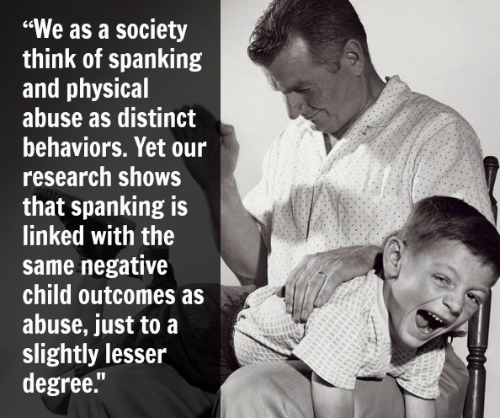I was spanked as a kid, as I suspect that many folks of my generation were. I don’t fault my father for it. That’s just what people did back then, when I was a kid growing up in the south. And, while we’ve never talked about it, I’m certain that, when my dad was a kid, he got it a hundred times worse from his father. So I really don’t mind the fact that, on occasion, my father, who was very young at the time, chose to spank me. With that said, though, quite a few of my most vivid memories of my father are not of the happy moments that we shared together, but of moments when he was hitting me with his belt for having done things that I can’t even remember. And that, I think, is probably the main reason why, when I became a father, I decided that I’d not strike my children. I suspect my decision was also influenced by the fact that I’ve always been doubtful as to how effective spanking is in preventing unwanted behaviors, but, when it comes right down to it, I just didn’t want for my children to have memories of me hitting them competing for space in their minds along with their better memories of me… Regardless of my motivation, though, it looks as though, according to research published yesterday, I made the right decision when I chose to “spare the rod”.
Yesterday, researchers at the University of Michigan and the University of Texas published what is being called the most definitive research to date on the subject of spanking (defined as “an open-handed hit on the behind or extremities”), and it appears to show that the practice is not only ineffective, but detrimental. According to the authors of the article, which was just published in the Journal of Family Psychology, the five decades of data they’ve assessed on 160,000 children has shown that spanking is significantly linked with 13 of the 17 outcomes they tracked, all in the direction of detrimental outcomes. In other words, spanking led to improvements in none of the outcomes being tracked.
According to Andrew Grogan-Kaylor, the University of Michigan School of Social Work professor who co-authored the article, they discovered that “spanking increases the likelihood of a wide variety of undesired outcomes for children,” essentially doing “the opposite of what parents usually want it to do.”
The following clip comes from the University of Texas press release announcing the publication.
The more children are spanked, the more likely they are to defy their parents and to experience increased anti-social behavior, aggression, mental health problems and cognitive difficulties, according to a new meta-analysis of 50 years of research on spanking by experts at The University of Texas at Austin and the University of Michigan…
“Our analysis focuses on what most Americans would recognize as spanking and not on potentially abusive behaviors,” says Elizabeth Gershoff, an associate professor of human development and family sciences at The University of Texas at Austin. “We found that spanking was associated with unintended detrimental outcomes and was not associated with more immediate or long-term compliance, which are parents’ intended outcomes when they discipline their children.”
Gershoff and Grogan-Kaylor tested for some long-term effects among adults who were spanked as children. The more they were spanked, the more likely they were to exhibit anti-social behavior and to experience mental health problems. They were also more likely to support physical punishment for their own children, which highlights one of the key ways that attitudes toward physical punishment are passed from generation to generation.
The researchers looked at a wide range of studies and noted that spanking was associated with negative outcomes consistently and across all types of studies, including those using the strongest methodologies such as longitudinal or experimental designs. As many as 80 percent of parents around the world spank their children, according to a 2014 UNICEF report. Gershoff notes that this persistence of spanking is in spite of the fact that there is no clear evidence of positive effects from spanking and ample evidence that it poses a risk of harm to children’s behavior and development.
Both spanking and physical abuse were associated with the same detrimental child outcomes in the same direction and nearly the same strength.
“We as a society think of spanking and physical abuse as distinct behaviors,” she says. “Yet our research shows that spanking is linked with the same negative child outcomes as abuse, just to a slightly lesser degree”…
Who would have thought… beating your children might actually be bad for them.
